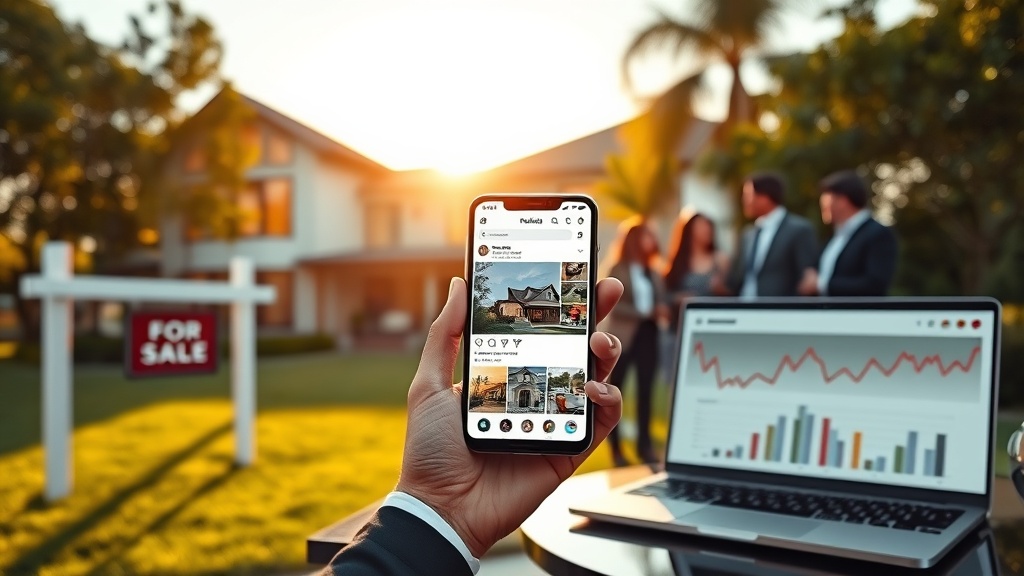The Ultimate Guide to Boosting Your Real Estate Brand on Social Media

" "
In today's digital age, social media stands as a colossal force in shaping various industries, with real estate being no exception. Whether you're a seasoned realtor, an emerging property developer, or a bustling real estate agency, mastering the art of social media can significantly amplify your brand's visibility and engagement. This guide explores how to effectively harness social media to elevate your real estate brand, blending historical insights with current trends and future predictions.
The Evolution of Real Estate Marketing
Before delving into strategies, it’s essential to understand how real estate marketing has transformed over the years. Traditionally, real estate agents relied heavily on print advertising, direct mail, and in-person networking. While these methods still hold value, the advent of the internet revolutionized the landscape.
A Brief Historical Context
1980s-1990s: The real estate industry primarily leaned on newspapers and magazines for listings. Open houses were a critical component, offering potential buyers a tangible feel of properties.
2000s: With the internet becoming widely accessible, real estate websites and online listings emerged. Platforms like Zillow and Realtor.com started gaining traction, allowing buyers to explore properties online.
2010s-present: Social media platforms like Facebook, Instagram, and LinkedIn have become integral to real estate marketing strategies. Agents can now reach larger audiences, foster personal connections, and showcase properties in innovative ways.
Why Social Media Matters for Real Estate
Social media not only bridges the gap between realtors and potential buyers but also fosters a sense of community and trust. Here’s why it’s indispensable:
- Wide Reach: With billions of active users worldwide, social media platforms offer unparalleled reach.
- Engagement: Unlike traditional media, social media allows for real-time interaction, enabling agents to build relationships and respond promptly to inquiries.
- Visual Appeal: Platforms like Instagram and Pinterest are perfect for showcasing high-quality photos and virtual tours of properties.
- Targeted Advertising: Social media allows for precise targeting, ensuring your ads reach the right demographic.
Choosing the Right Platforms
Selecting the best social media platforms is crucial for an effective strategy. Here, we'll explore the top platforms suitable for real estate marketing.
- Demographics: With over 2.8 billion users, Facebook caters to a diverse audience, making it ideal for reaching a broad spectrum of potential clients.
- Features: Utilize Facebook Pages for your business, Groups to build communities, and Facebook Ads for targeted marketing.
- Real-World Scenario: A real estate agent in Miami created a Facebook Group for local property investors, fostering a community that shares insights and opportunities, leading to increased referrals.
- Demographics: Popular among younger audiences, particularly millennials interested in visual content.
- Features: Leverage Instagram Stories for behind-the-scenes content, IGTV for longer videos, and Reels for short, engaging clips.
- Real-World Scenario: A boutique real estate agency in Los Angeles uses Instagram Stories to provide virtual open house tours, increasing engagement during the pandemic when physical visits were limited.
- Demographics: Known for its professional user base, LinkedIn is perfect for B2B interactions, networking, and showcasing expertise.
- Features: Share blog posts, join industry groups, and utilize LinkedIn Ads to target professionals.
- Real-World Scenario: A commercial real estate firm uses LinkedIn to connect with corporate clients and share industry insights, positioning themselves as thought leaders.
- Demographics: Best suited for quick updates and engaging with industry news.
- Features: Use hashtags strategically, engage in Twitter Chats, and follow industry influencers.
- Real-World Scenario: A large real estate firm uses Twitter to announce new listings and engage with local news outlets, gaining media coverage and traction.
- Demographics: Predominantly female audience, ideal for showcasing design ideas and property aesthetics.
- Features: Create boards for different property types, neighborhood guides, and home-staging tips.
- Real-World Scenario: A home staging company uses Pinterest to showcase before-and-after transformations, driving traffic to their website and increasing bookings.
Building a Strong Brand Identity
A clear, consistent brand identity is fundamental to standing out on social media. Here’s how you can cultivate a compelling brand:
Define Your Brand’s Voice
- Consistency is Key: Ensure your brand voice is consistent across all platforms, whether it’s professional, casual, or somewhere in between.
- Real-World Scenario: A real estate startup focused on eco-friendly homes maintains a warm and informative tone across social media, reinforcing their commitment to sustainability.
Create a Unified Aesthetic
- Visual Cohesion: Use a consistent color palette, typography, and logo placement.
- Real-World Scenario: A luxury real estate agency uses a cohesive aesthetic on Instagram, enhancing brand recognition and attracting high-end clients.
Share Your Story
- Authenticity Matters: Share the journey of your business, your values, and the people behind the brand.
- Real-World Scenario: A family-owned real estate business shares weekly posts highlighting their history and community involvement, building a strong local following.
Content Strategies for Real Estate
Creating engaging and valuable content is the cornerstone of any successful social media strategy. Here are some effective content types:
Property Showcases
- High-Quality Visuals: Use professional photography and videography to highlight the best aspects of a property.
- Real-World Scenario: An agent in New York uses drone footage to capture stunning aerial views of luxury properties, setting them apart from competitors.
Educational Content
- Value-Driven Posts: Share tips on home buying, market trends, and real estate investment.
- Real-World Scenario: A real estate blog shares bi-weekly articles on market analysis, attracting readers who are serious about property investment.
Client Testimonials
- Build Trust: Share success stories and client testimonials to build credibility.
- Real-World Scenario: An agent posts video testimonials from satisfied clients, fostering trust among potential buyers.
Interactive Content
- Engagement is Key: Use polls, quizzes, and Q&A sessions to interact with your audience.
- Real-World Scenario: A real estate agency runs weekly Q&A sessions on Instagram Live, answering common buyer questions, and boosting engagement.
Leveraging Paid Advertising
While organic reach is valuable, paid advertising on social media can significantly expand your audience. Here's how to do it effectively:
Facebook and Instagram Ads
- Targeting Options: Use detailed targeting to reach specific demographics, interests, and behaviors.
- Real-World Scenario: A luxury real estate brand uses Facebook Ads to target high-net-worth individuals in specific zip codes, resulting in a higher conversion rate.
LinkedIn Ads
- Professional Targeting: Ideal for commercial real estate and B2B services.
- Real-World Scenario: A commercial property firm uses LinkedIn Ads to target business executives looking for office spaces, generating quality leads.
Twitter Ads
- Promoted Tweets: Use these for quick announcements or promoting blog content.
- Real-World Scenario: A real estate agency promotes tweets about their latest market report, increasing their visibility among industry professionals.
Measuring Success
To ensure your strategies are effective, it’s crucial to track and measure your performance. Here are key metrics to consider:
Engagement Metrics
- Likes, Comments, Shares: These indicate how well your content resonates with your audience.
- Real-World Scenario: A real estate firm tracks engagement metrics to identify popular content themes, adjusting their strategy accordingly.
Traffic and Leads
- Website Traffic: Monitor how much traffic social media drives to your website.
- Real-World Scenario: An agency uses Google Analytics to track website traffic from social media, identifying which platforms generate the most leads.
Conversion Rates
- Lead Generation: Measure how many social media leads convert into actual clients.
- Real-World Scenario: A realtor tracks conversion rates from Instagram ads, optimizing their campaigns to improve ROI.
Future Trends in Real Estate Social Media Marketing
As technology evolves, so too does the landscape of social media marketing. Here are some trends to watch:
Virtual Reality and Augmented Reality
- Immersive Experiences: VR and AR can offer potential buyers immersive property tours.
- Real-World Scenario: A forward-thinking agency offers VR tours of luxury homes on Instagram, appealing to tech-savvy buyers.
AI and Chatbots
- 24/7 Engagement: Use AI-powered chatbots for instant responses to inquiries.
- Real-World Scenario: A large real estate firm implements chatbots on Facebook Messenger, improving response times and customer satisfaction.
User-Generated Content
- Community Building: Encourage clients to share their experiences and tag your brand.
- Real-World Scenario: A real estate agency runs a photo contest for homeowners, generating authentic content and increasing brand visibility.
Conclusion
Social media is an invaluable tool for boosting your real estate brand, offering opportunities for engagement, visibility, and growth. By selecting the right platforms, crafting compelling content, and leveraging both organic and paid strategies, you can establish a formidable presence in the competitive real estate market. As trends continue to evolve, staying adaptable and forward-thinking will ensure your brand remains relevant and successful in the years to come.











